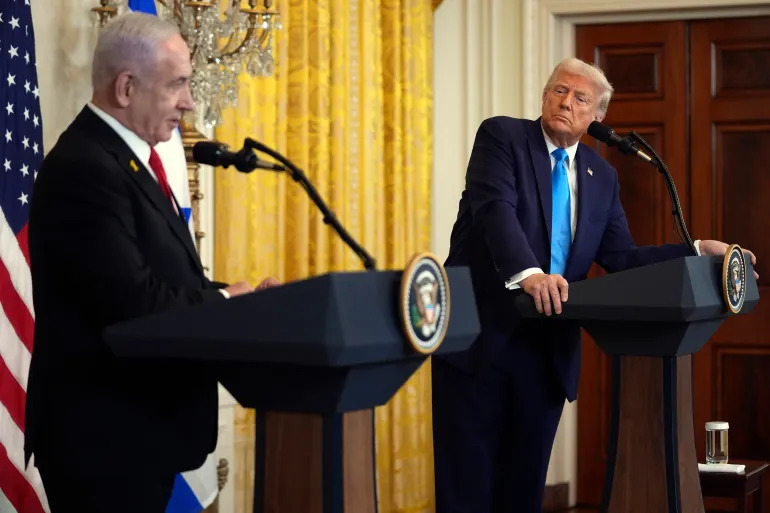Trump Proposes U.S. Takeover of Gaza in Radical Shift on Middle East Policy
In a stunning departure from longstanding U.S. policy on the Israeli-Palestinian conflict, President Donald Trump proposed that the United States “take over” the Gaza Strip, suggesting it could be transformed into a thriving economic hub under American control. Speaking alongside Israeli Prime Minister Benjamin Netanyahu at a joint news conference in the White House, Trump described the war-torn region as an opportunity for development, envisioning it as “the Riviera of the Middle East.”
Trump’s remarks have sparked controversy, with critics denouncing the proposal as a drastic shift that would violate international law and deepen regional tensions. He suggested that the U.S. would assume long-term responsibility for Gaza, including dismantling unexploded bombs and rebuilding the region’s infrastructure. The president emphasized that Gaza, which has been ravaged by over a year of fighting between Israel and Hamas, could be revitalized into a thriving area that would benefit not only the U.S. but the entire Middle East.
While Trump did not outline specifics on how the U.S. could take control of Gaza, or under what authority, he painted an optimistic picture of the region’s potential, claiming that it could become a beacon of prosperity. “We’ll own it and be responsible for dismantling all of the dangerous unexploded bombs and other weapons on the site,” Trump said. “We’re going to develop it, create thousands and thousands of jobs, and it’ll be something that the entire Middle East can be very proud of.”
The idea of Gaza becoming a U.S. territory has been met with skepticism and strong opposition. Critics argue that it represents a dangerous form of imperialism, with former U.S. intelligence officials warning that such a proposal could ignite instability throughout the region. Human rights groups have condemned the idea of displacing the Palestinians living in Gaza, calling it a form of ethnic cleansing. “The people of Gaza will not allow such plans to pass,” said senior Hamas official Sami Abu Zuhri.
Trump’s proposal also aligns with his previous comments about resettling Palestinians from Gaza to neighboring countries. He suggested that Egypt and Jordan could take in Palestinian refugees, despite their public rejection of such proposals in the past. This stance has only added fuel to the fire, as many regional leaders view the forced displacement of Palestinians as a violation of their fundamental rights.
Trump’s remarks also have profound implications for his relationship with Saudi Arabia, a key ally in the Middle East. The Saudi government issued a statement reiterating its stance that it will not normalize relations with Israel without a Palestinian state, making it clear that any attempt to displace Palestinians would be unacceptable. Trump’s plan could undermine efforts to broker normalization agreements with Arab nations, which he has championed as a key foreign policy goal.
Netanyahu, who has had a close relationship with Trump, praised the U.S. president for thinking “outside the box.” However, even some of Trump’s allies in the U.S. have expressed concern. Republican Senator Lindsey Graham of South Carolina questioned the viability of such a proposal, suggesting that it could face significant opposition from both the American public and international partners.
The White House’s response to these concerns remains unclear, as Trump has not provided a detailed framework for how the U.S. would assume control over Gaza or how the transition would unfold. This lack of clarity, combined with the backlash from various stakeholders, has raised questions about the feasibility and legitimacy of Trump’s plan.








